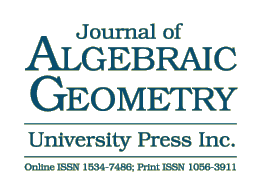Completion of Katz-Qin-Ruan’s enumeration of genus-two plane curves
Author:
Aleksey Zinger
Journal:
J. Algebraic Geom. 13 (2004), 547-561
DOI:
https://doi.org/10.1090/S1056-3911-03-00353-9
Published electronically:
December 8, 2003
MathSciNet review:
2047680
Full-text PDF
Abstract |
References |
Additional Information
Abstract: We give a formula for the number of plane curves of degree $d$ and genus $2$ with fixed complex structure passing through $3d\!-\!2$ points in general position. This is achieved by completing the Katz-Qin-Ruan approach. This paper’s formula agrees with the one obtained by the author in a completely different way.
[DH]DH S. Diaz and J. Harris, Geometry of Severi Varieties, Trans. Amer. Math. Soc. 309, No. 1 (1988), 1–34.
[GH]GH P. Griffiths and J. Harris, Principles of Algebraic Geometry, John Willey & Sons, 1994.
[I]I E. Ionel, Genus-One Enumerative Invariants in $\mathbb {P}^n$ with Fixed $j$-Invariant, Duke Math. J. 94 (1998), no. 2, 279–324.
[KM]KM M. Kontsevich and Yu. Manin, Gromov-Witten Classes, Quantum Cohomology, and Enumerative Geometry, Comm. Math. Phys. 164 (1994), no. 3, 525–562.
[KQR]KQR S. Katz, Z. Qin, and Y. Ruan, Enumeration of Nodal Genus-$2$ Plane Curves with Fixed Complex Structure, J. Algebraic Geom. 7 (1998), no. 3, 569–587.
[P]P R. Pandharipande, Counting Elliptic Plane Curves with Fixed $j$-Invariant, Proc. Amer. Math. Soc. 125 (1997), no. 12, 3471–3479.
[RT]RT Y. Ruan and G. Tian, A Mathematical Theory of Quantum Cohomology, J. Diff. Geom. 42 (1995), no. 2, 259–367.
[V1]V1 R. Vakil, Enumerative Geometry of Plane Curve of Low Genus, AG/9803007.
[V2]V2 R. Vakil, A Tool for Stable Reduction of Curves on Surfaces, Advances in Algebraic Geometry Motivated by Physics, 145–154, Amer. Math. Soc., 2001.
[Z]Z A. Zinger, Enumeration of Genus-Two Curves with a Fixed Complex Structure in $\mathbb {P}^2$ and $\mathbb {P}^3$, math.SG/0201254.
[DH]DH S. Diaz and J. Harris, Geometry of Severi Varieties, Trans. Amer. Math. Soc. 309, No. 1 (1988), 1–34.
[GH]GH P. Griffiths and J. Harris, Principles of Algebraic Geometry, John Willey & Sons, 1994.
[I]I E. Ionel, Genus-One Enumerative Invariants in $\mathbb {P}^n$ with Fixed $j$-Invariant, Duke Math. J. 94 (1998), no. 2, 279–324.
[KM]KM M. Kontsevich and Yu. Manin, Gromov-Witten Classes, Quantum Cohomology, and Enumerative Geometry, Comm. Math. Phys. 164 (1994), no. 3, 525–562.
[KQR]KQR S. Katz, Z. Qin, and Y. Ruan, Enumeration of Nodal Genus-$2$ Plane Curves with Fixed Complex Structure, J. Algebraic Geom. 7 (1998), no. 3, 569–587.
[P]P R. Pandharipande, Counting Elliptic Plane Curves with Fixed $j$-Invariant, Proc. Amer. Math. Soc. 125 (1997), no. 12, 3471–3479.
[RT]RT Y. Ruan and G. Tian, A Mathematical Theory of Quantum Cohomology, J. Diff. Geom. 42 (1995), no. 2, 259–367.
[V1]V1 R. Vakil, Enumerative Geometry of Plane Curve of Low Genus, AG/9803007.
[V2]V2 R. Vakil, A Tool for Stable Reduction of Curves on Surfaces, Advances in Algebraic Geometry Motivated by Physics, 145–154, Amer. Math. Soc., 2001.
[Z]Z A. Zinger, Enumeration of Genus-Two Curves with a Fixed Complex Structure in $\mathbb {P}^2$ and $\mathbb {P}^3$, math.SG/0201254.
Additional Information
Aleksey Zinger
Affiliation:
Department of Mathematics, Massachusetts Institute of Technology, 77 Massachusetts Avenue, Rm 2-586, Cambridge, Massachusetts 02139
Address at time of publication:
Department of Mathematics, Stanford University, Stanford, California 94305-2125
Email:
azinger@math.mit.edu, azinger@math.stanford.edu
Received by editor(s):
February 1, 2002
Published electronically:
December 8, 2003
Additional Notes:
Partially supported by an NSF Graduate Research Fellowship and NSF grant DMS-9803166



